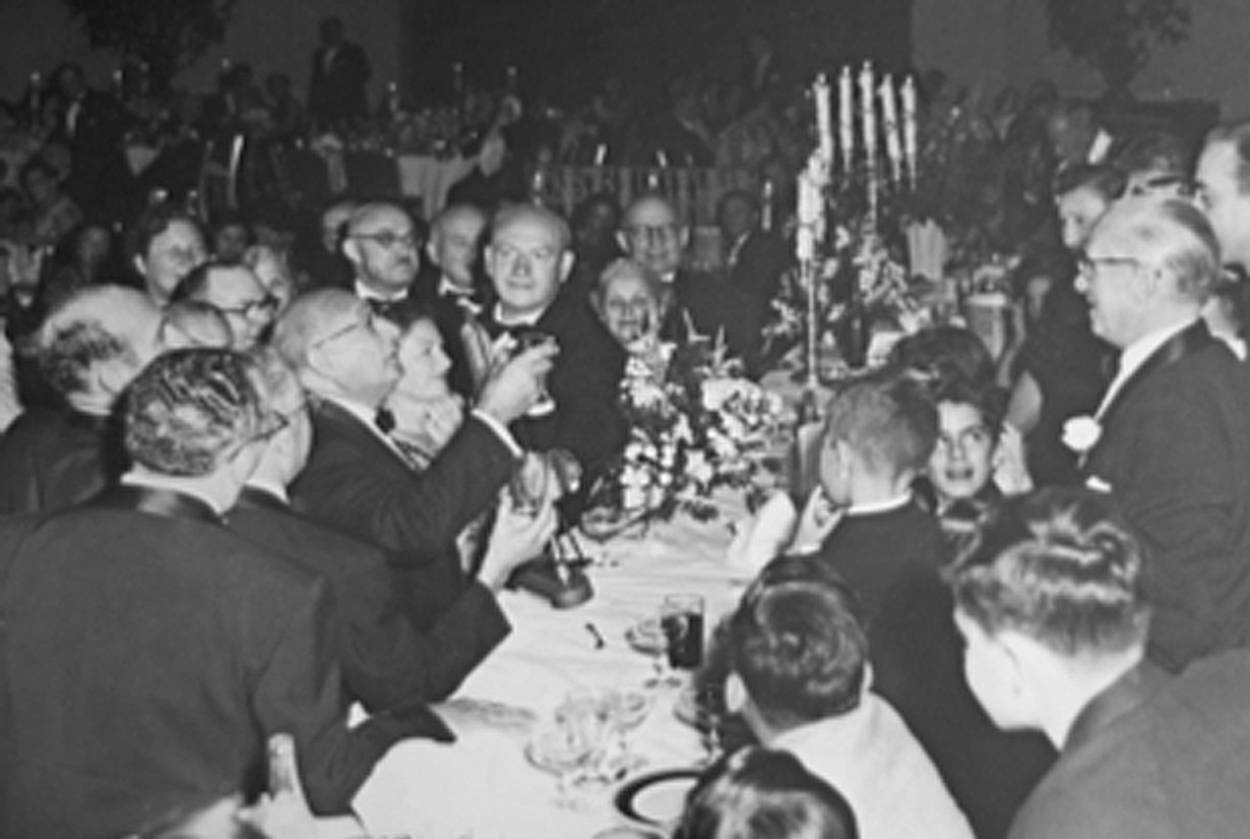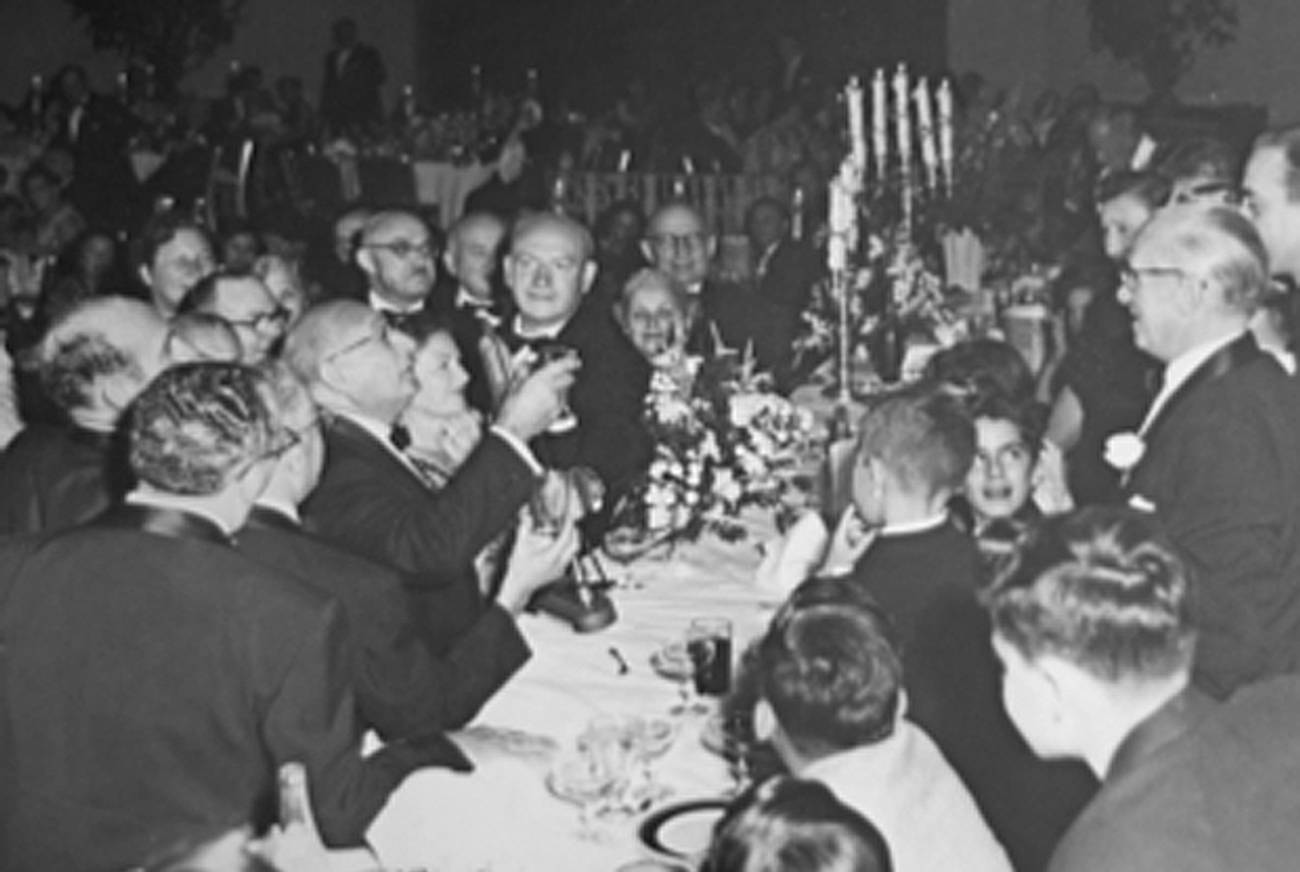Remembering My Bar Mitzvah, 60 Years Later
The party was taped on silent 8-millimeter film, which I only later appreciated




In a Long Island synagogue, a 13 year-old boy, suited and very serious, peers out at the congregation and squeaks, “The HafTORah we READ today was a MESSage deLIVered by the PROphet E-ZEKiel to the JEWS who LIVED in BabyLONia in the SIXTH CENtury beFORE the COMmon EEra.” It’s the Shabbat service during Sukkot in September 1953. After the boy chants the prescribed Hebrew text, he piously acknowledges his connection to “the heritage for which Jews have labored and by which Jews have lived for many centuries.” This final prayer was handed to him a few days earlier. An afterthought, it had been prepared for somebody else.
The voice is mine, taped 60 years ago at the insistence of my mother, a record of my bar mitzvah ceremony. It is earnest, straining to sustain the solemnity of the moment. Reaching for liturgical gravity, it arrives, alas, only at pomposity. Of course I’m biased, but I hear an unmistakable charm and boyish innocence in the effort.
I’d learned my lines, strutted and fretted my hour upon the stage, and now it was done. But was it? Looking back, I wonder what remains of the 13-year-old boy in this 73-year-old man. Everyone told me that, as a bar mitzvah, I had now become a man in the eyes of the Jewish community. I didn’t feel like one, and I didn’t want to be one. I wanted less responsibility, not more. I saw the completion of my bar mitzvah as a get-out-of-jail free card. I was overjoyed to have finished the seemingly interminable preparation that promised only public humiliation, requiring me to read and chant in a mystifying language. I looked forward to never again facing synagogue officials who wielded intimidation as a tool to assure attentiveness. I welcomed the end of weighted parental expectations with their unsubtle accounts of how simply wonderful their friends’ sons had performed at their bar mitzvahs.
Simon and Garfunkel encourage us to “preserve your memories, they’re all that’s left you.” My synagogue performance was feted that night at a posh Essex House dinner-dance. Preserved forever on a silent eight-millimeter movie, occasional viewings over the years have provided continuous amusement. The filmmakers fall back on every imaginable cinematic cliché: cue up the montage of heart-warming black and white photos chronicling the bar mitzvah boy’s life; dissolve to a live color shot of him–me–smiling happily (as directed), basking in the spotlight. I hold out my hands and a tallis to drape around my shoulders magically appears. I touch the top of my head and a yarmulke suddenly plops into place. Prompted, family members endlessly straighten my spiffy silver tie. You can all but hear the unseen cinematographer urging energetic handshakes and celebratory kisses, directing aunts and uncles to lean in and share with me unheard words of wisdom, pleading with cousins to josh playfully with the bar mitzvah boy. Panning the room, the camera stops to admire the chopped chicken liver sculpture. It glides over the endless buffet overflowing with religiously forbidden foods.
It is not an intimate affair. The hundreds of attendees are elegantly dressed (except for the handful of dour, religiously observant family members wearing dark clothes and furrowed brows). The men are dressed in high-end tuxedos, while the women debut floor-length, off-the-shoulder gowns with beaded fronts boasting ample bosoms. Chunky necklaces and bracelets complete the ensembles. Nearly everyone holds a shot glass or a cocktail (not wine) and a cigarette. Playing the role of honored guest, more than one pantomimes to the camera, “Mazel tov,” or “Congratulations,” or “What a wonderful affair.”
And so it is. The room throbs with friendly banter, abundant hugging and kissing, clapping and singing, shaking and dancing. The bar mitzvah boy, seated apart on a raised dais with young relatives and friends, welcomes the guests and leads the motzi, the ritual breaking of bread, reminding everyone that they’re there to celebrate his emergence as an adult member of the community. After a dutiful pause, the party continues.
Over time, the early elegance dissipates, as food and drink take their toll. The pace livens, ties are loosened, hugs last longer. Demand for “stage time” intensifies. Flushed-faced, some men wave the camera over as one of their wives swings her flowing skirt dance-hall style in time to the music. The camera captures her husband’s hand sneaking over her shoulder, playfully plunging down the front of her dress. It is quickly rebuffed. Elsewhere, a group poses for a picture. The camera lingers as a man ever so slowly floats a slender hand onto the beaded breast of his companion. Perhaps the woman doesn’t notice or doesn’t care, for there it stays.
It was quite an affair.
It is easy to look with disdain at that long-ago Saturday night. How silly and childish these people could be. The tumult, the preening before the camera! Embarrassing. Inappropriate. Yet surely in the soundless nocturnal parade from long ago there is an explanation for the sudden affection I feel for these people. There must be clues to the deeper communal DNA that connects me to these first and second generation Jews, almost all of whom are now dead. Could it be that, although I knew these people, in some significant way I didn’t know them at all?
A long-neglected, shamefully ignored oral history, undertaken with my maternal grandfather 40 years ago, guides me to new insights into the meaning of that day and night. In a raspy voice, heavily accented even after 70 years in this country, my grandfather observes, “We were poor people, Larry.” His father worked for pennies in a cigar factory, while his mother ran a small grocery store and took care of the children. I ask him why he came to America, and he says that he decided to come here because there was no opportunity for him in Poland. He faced a long conscription into the Russian army, and besides he’d already served three-months in jail, charged with distributing socialist pamphlets.
My grandfather recounts many episodes about his early years in this country, his struggles to start a business and raise a family. He lived with a wife and child “on the fifth floor, the penthouse” he says, and laughs. He trudged the stairs daily, leaving for work early and returning late, lugging his tools and the groceries and the baby carriage up and down the five flights. Where would the $16 monthly rent come from? How do I explain to the bank why I can’t repay the $300 loan? “I had a hard life,” he repeats. The memories echo: we were poor people, Larry. Very poor.
The story, however, ends differently. My grandfather built a successful manufacturing business. In his life, he was charitable and exceedingly generous to family members who needed helped. And yet, the theme recurs: his life had been hard. The conviction that he overcame many obstacles in achieving success is deeply and personally held. But the story of his childhood in Warsaw and his immigrant experiences in America is certainly not his alone. He shares a narrative with innumerable immigrants, including many of the people enjoying themselves in front of the camera at my Bar Mitzvah.
On the way to America, needing money, my grandfather, during a stopover in Antwerp, sold his watch and chain. I ask him, recalling an American custom, if that had been his bar mitzvah watch. “What bar mitzvah watch?” His voice rises. “Who gives a bar mitzvah watch? What’s the matter with you?” he asks, more surprised at my naïveté than angry. For his own bar mitzvah, he points out, his father invited a dozen people back to their walk-up apartment after synagogue (also “the penthouse”) where they were served some herring, schnapps, and cookies.
My bar mitzvah is different. Toward the end of the evening, a large group of his closest friends gather in front of the dais to sing a congratulatory song (most likely in Yiddish) to me, my parents, and grandparents. The camera captures the bar mitzvah boy visibly shrinking in embarrassment in the face of this serenade exuberantly belted out by a bunch of old strangers. (They were, it should be noted, probably 10 years younger then than I am now). Utterly mortified, I look over my shoulder to my grandfather.
For 60 years, I’d understood my glance back to him as a plea for help. Your friends are humiliating me; please make it stop. The subject of that image had always been me. Now, 60 years later, I see something other than—even more important than—my own self-consciousness. I see radiance in my grandfather’s face, his unalloyed joy as he celebrates in America, with family and friends, the bar mitzvah of his eldest grandson.
The storytelling of an older man in a broken tongue has reframed and, in a sense, allowed me to make peace with fragmentary memories of a day and night from 60 years ago. Turning to my grandfather in embarrassment has now, many years later, been transfigured into an act of teshuvah, or repentance, in which I acknowledge my failure to understand how profoundly important my bar mitzvah had been to him.
Moreover, I see now how his happiness may have mirrored, although in a different way, the meaning of the event to others of his generation. After their turn on the Essex House “improv stage,” the elegantly coiffed women and finely-garbed men undoubtedly returned to daily lives very much like all others. But for a short time in front of the camera, the bar mitzvah of one of their own allowed them to celebrate the transformation of their immigrant lives into American success stories. Listen closely, echoing behind the silent, playful images one might hear: ‘Look at us! We arrived here penniless and alone, not speaking the language, and we succeeded. Look! Turn the camera this way. We dress well, we’re happy, and we know how to enjoy ourselves. We’ve earned our happiness.’
This year, on the Shabbat that falls during Sukkot, when some young boy or girl will chant from the Book of Ezekiel, I’ll remember my grandfather’s stories and recall his joy at my bar mitzvah. And I will smile not in approval but with empathy for the fleeting happiness with which his community–my community–proclaimed and celebrated their American lives in the best way they knew how. Sixty years on, I will find strength in what remains behind even as I face the narrowing of the light that lies ahead.
Lawrence Rubin is an adjunct professor in the English department at Fordham University.